IMPRESSIONS: Rena Anakwe, ms. z tye and Ogemdi Ude at The Kitchen's Dance and Process
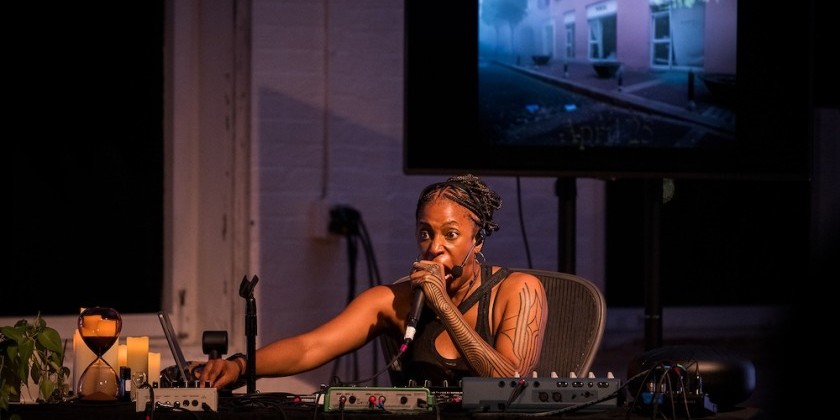
H.A.I. (Healers Anonymous International created and performed by Rena Anakwe
The Unsinkable created and performed by ms. z tye
what wanting wanted with what wanting was created and performed by Ogemdi Ude
Lighting Designer: Nicholas Houfek
Stage Manager: Maurina Lioce
Production Manager: David Riley
Production Supervisor: Tassja Walker
Dance and Process is organized by mayfield brooks and Niall Jones with Matthew Lyons, Curator, and Angelique Rosales Salgado, Curatorial Assistant
The Kitchen’s Dance and Process (DAP) residency program creates space for a cohort of artists to experiment with choreographic methods and dance practice through a shared process. Facilitated by DAP alums mayfield brooks and Niall Jones, the 2024 cohort includes interdisciplinary artists Rena Anakwe, ms. z tye, and Ogemdi Ude. Each artist interweaves their distinctive movement practice with elements of voice, theater, text, installation, technology, and community-making. By interrogating the meanings and manifestations of choreography, they venture together into uncharted aural, spatial, and affective territories that challenge prevailing ideas of embodied performance.
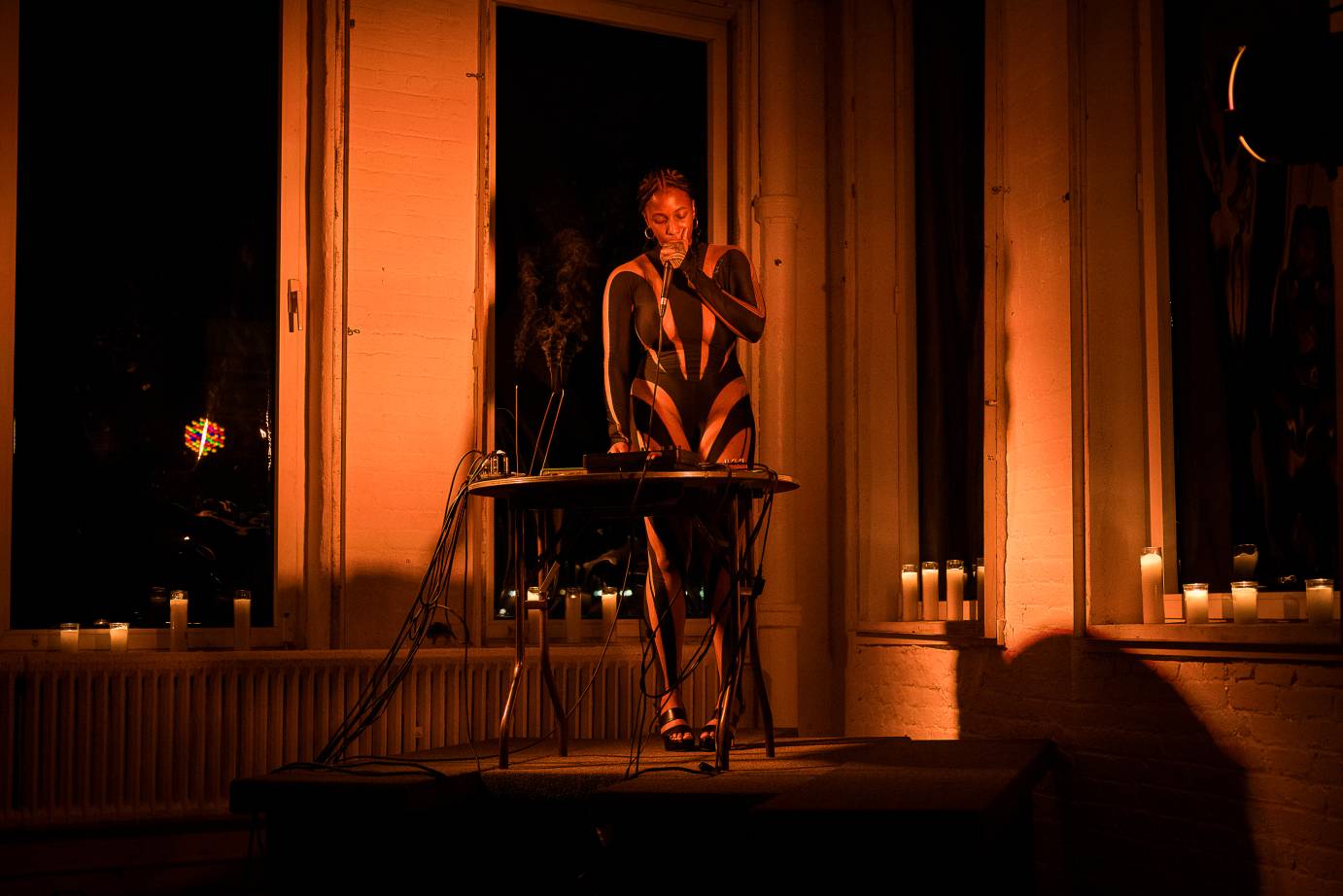
The DAP artists began their residency at The Kitchen’s airy Westbeth loft in July, a tenure which is amply evident in the ways they inhabit and transform the space. Their offerings, while distinct, spill into one another with a natural flow that mirrors the loft’s open floor plan. While we see the container for everything at once, each space activates in turn to gradually illuminate a sense of wholeness. Anakwe’s performance threads through the evening in three parts, with tye and Ude’s works blooming between. The program’s three-hour runtime might be daunting, but its tonal shifts and ambulatory nature offer an array of perspectives that make for time and attention well spent as a final summer sunset’s golden beams and blushing glow fade to twinkling night over the Hudson.
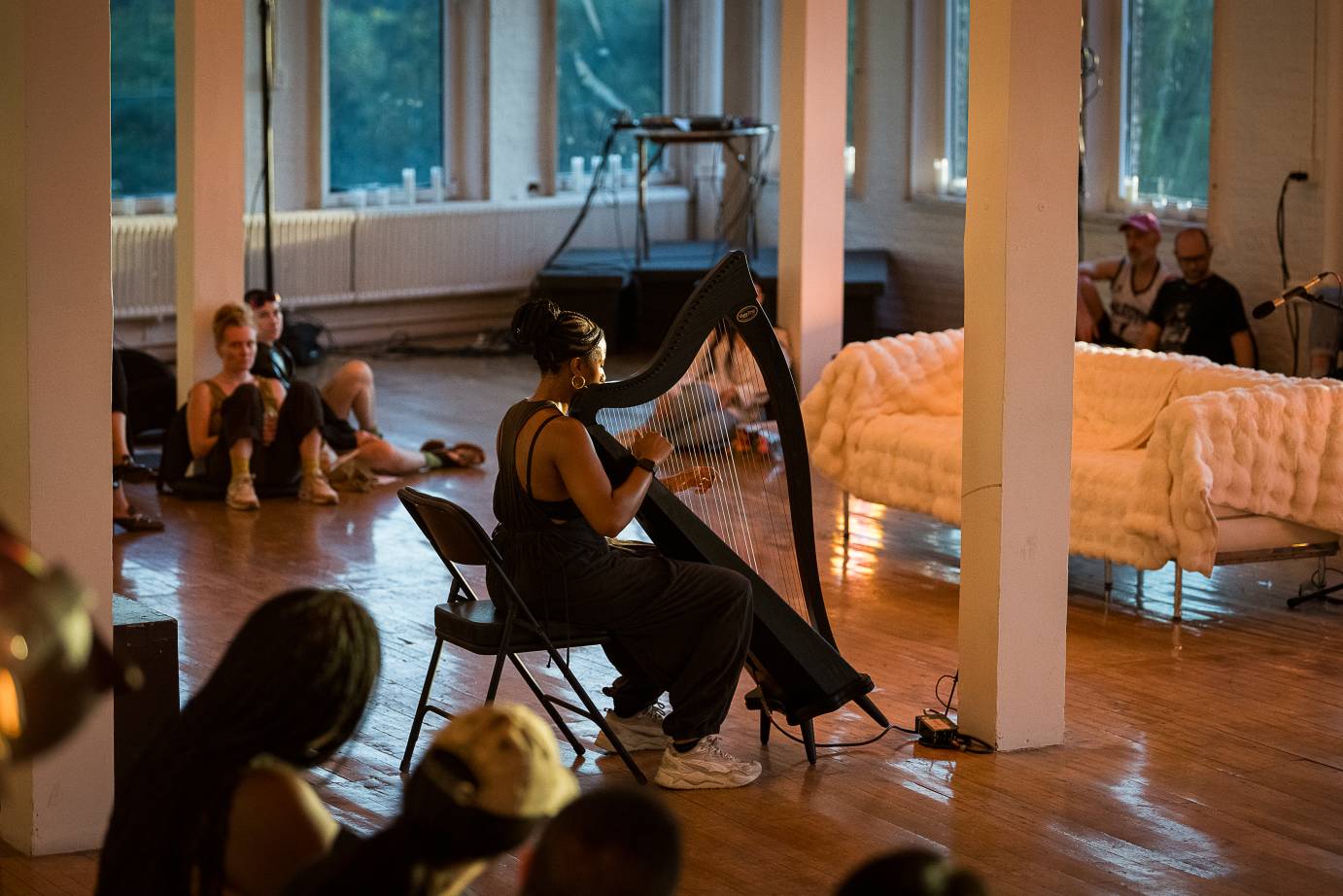
The opening sequence of Anakwe’s “H.A.I. (Healers Anonymous International)” cleanses and grounds the space. A warm sensory background — the smell of incense, the sound of crackling fire, the sublime golden hour — holds the artist as she warms herself, the room, and us in preparation for a shared journey. Her long, pure tones ring like vocal yawns to meld with deep squats and stretches, sound and movement drawn together in breath. She seeks comfort in her restless, elastic meandering as she clears the space with the round tones of swinging chimes, their vibrations almost visible as the air fills with sound. She plucks celestial languor from an electric harp in ripples and waves of sonorous lows and delicate highs. Her body’s weight pulsates from the spine, tense with gravity and sensitive tactility — a resonant instrument of flesh.
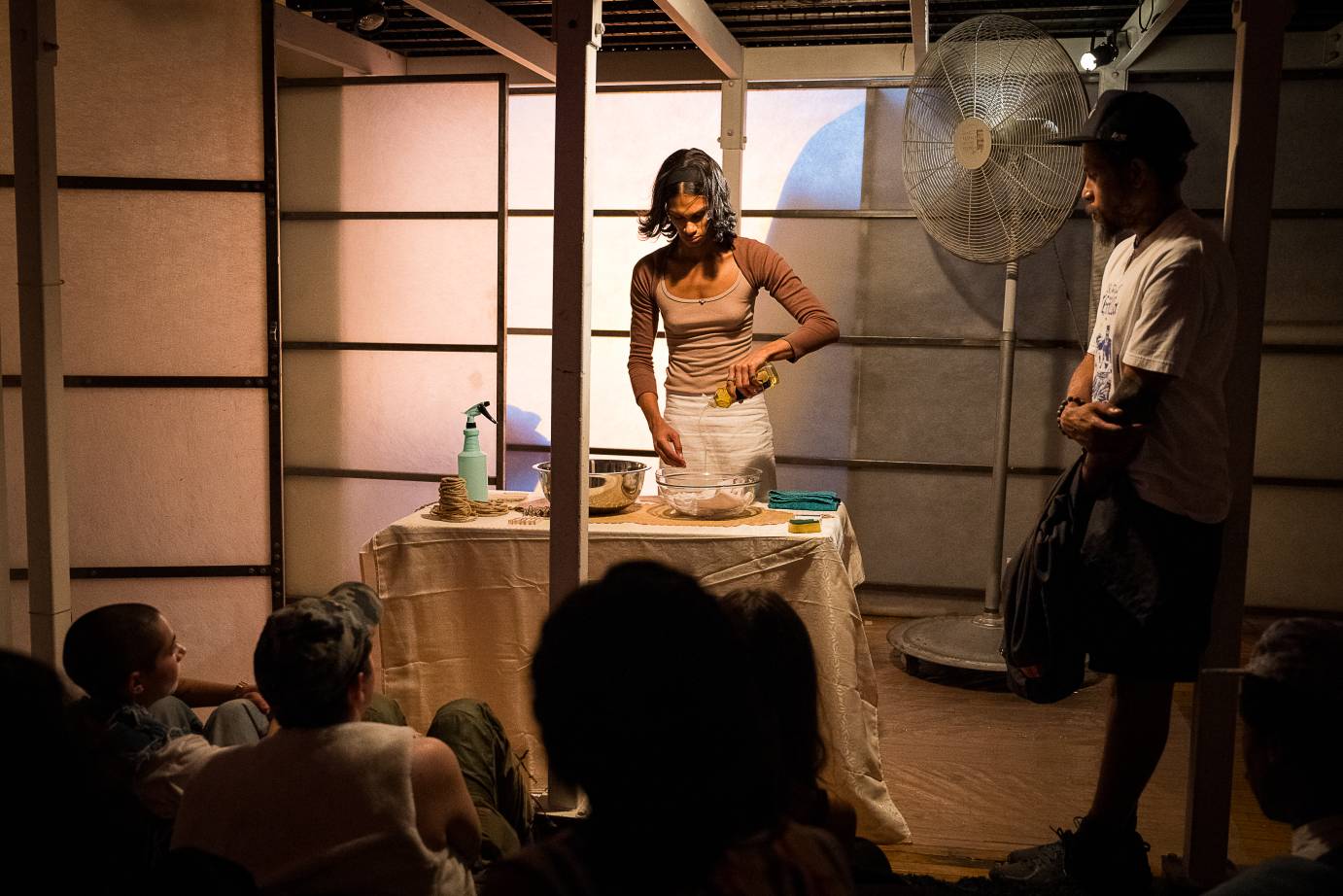
Together we are blessed by her spell and guided to the next, through a wide doorway and into a jewel box of a room we had only glimpsed before. Here ms. z tye activates her installation, The Unsinkable, as an homage to her grandmother’s domestic labor and divine feminine knowledge.
The room, imbued with the scent of fresh flowers, is a housewife’s dream remembered in rich pastels: warm white, deep blue, dusty lavender, and tye herself neatly coiffed and clad in demure neutrals. Sight lines are obstructed in the intimate, oddly-configured space, and each of us must work to negotiate the shifting privileges and obstacles of our particular seat.
The artist sets quietly about an array of domestic tasks with a tender reverence for the feminine domain: she shakes out and folds crisp white sheets, sprinkles and vacuums the shag carpet, hand washes a pair of delicates. Four air mattresses rise and fill like monoliths set vertically against the wall behind her, the drone of their motors humming in chorus. She pauses to enjoy a soulful gospel song on her boombox — a private moment of repose with a snack and a Coke.
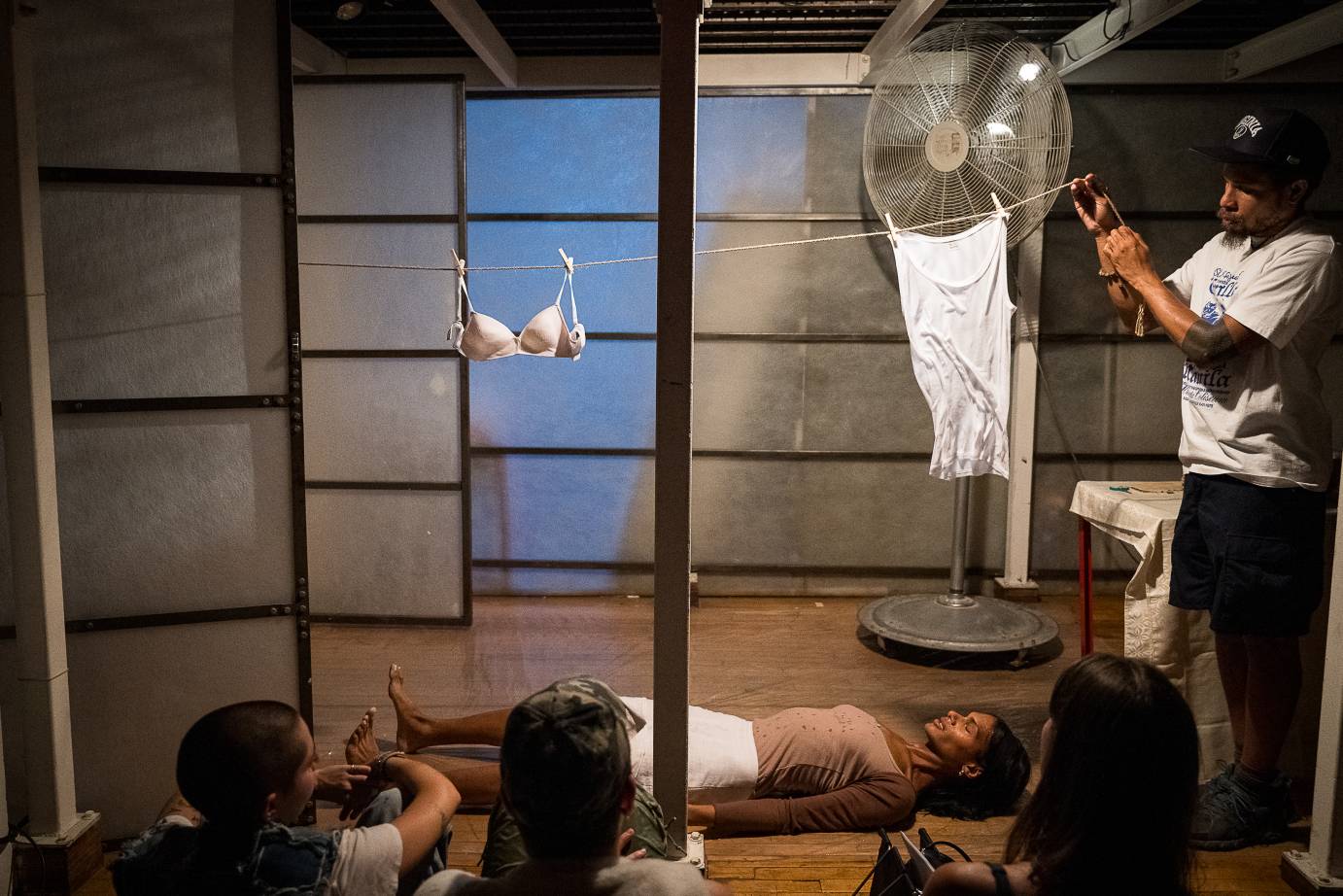
Her tasks interweave with small rituals: she taps two audience members to hold a clothesline, then lies down and slides slowly under her dripping garments while singing a reprise of the gospel song’s chorus: “cooling water from grandma’s well.” Her looping song continues and crossfades into a funky rhythmic two-step to James Brown’s “The Big Payback” as she dresses a stacked pair of mattresses with sheets and pillows. With a gentle gaze and courteous hand, she ushers her volunteers into the beds and leads them through an incantation: “you are shocked by nothing,” “just surrender,” “try not to move,” “thank you for your labor.”
Once they are at rest, she flips the deflate valves on the mattresses one by one. As the beds implode, support systems collapse under inert bodies, softly enveloping them as they sink to approach emptiness — a long breath let all the way out. Materiality and metaphor collide in this dream space, in this place of loving memory where recognition and validation take flight.
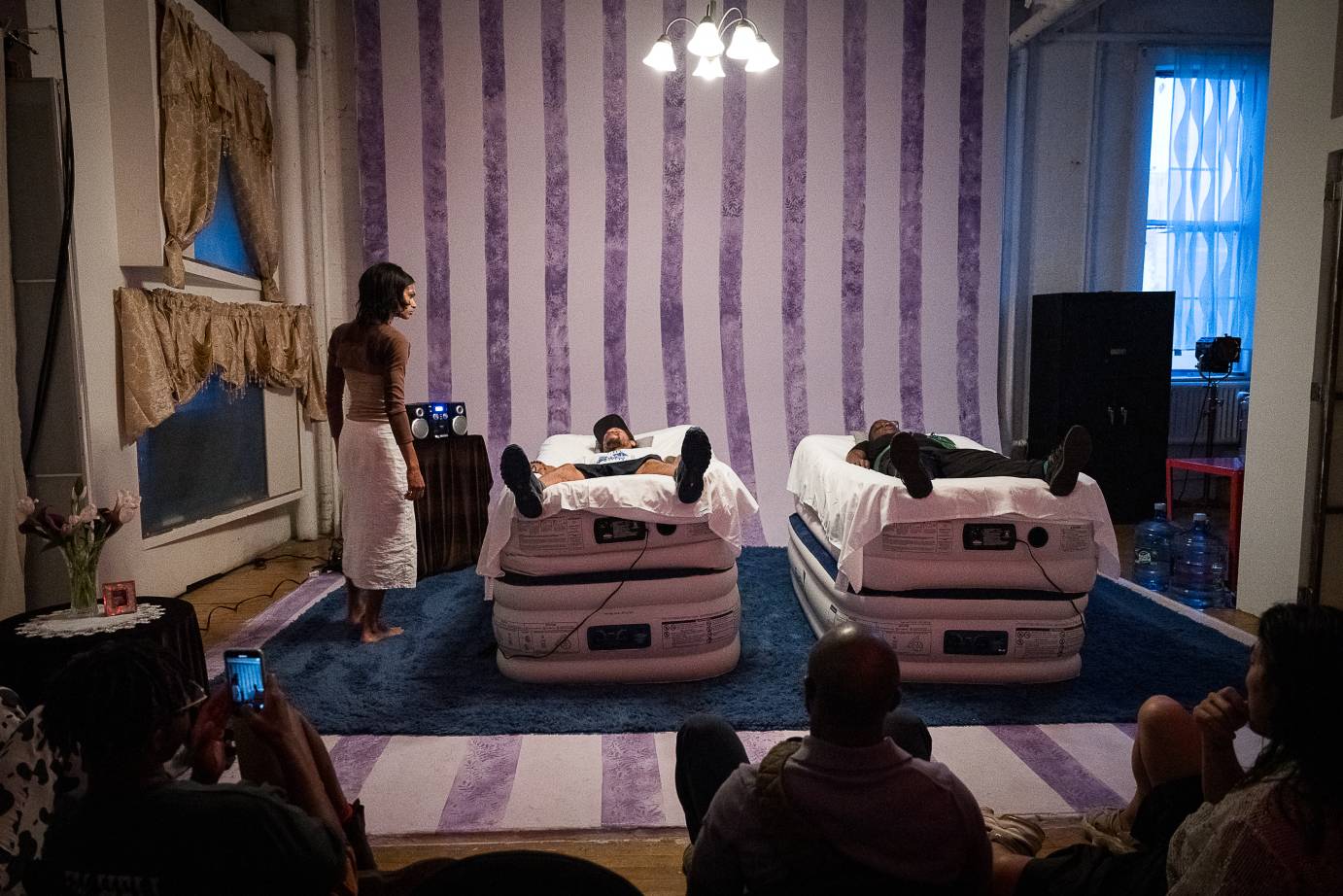
After a quiet interval, a shift in the soundscape beckons us back to the main loft area — now nearly in twilight — where Anakwe sets up for a live broadcast of her Healers Anonymous International public access TV show. As the show’s charismatic host, she gives two audience volunteers free five-minute healing sessions, taking them matter-of-factly through an intake questionnaire (both have their health insurance summarily declined) and leading them through personalized sound healing and guided meditation to cheekily cleanse their stated woes.
Between sessions she brings us a sinister “word from our sponsors,” a spiraling cacophony of sounds and images that reveal the insidious underbelly of the commercial wellness industry. She loops echoes and reverbs of voice and sound as infomercials and news clips shuffle on the screen behind her, evidence of the interlocking violences of war, consumerism, and the climate crisis — even spiritual healing comes at a heavy price.
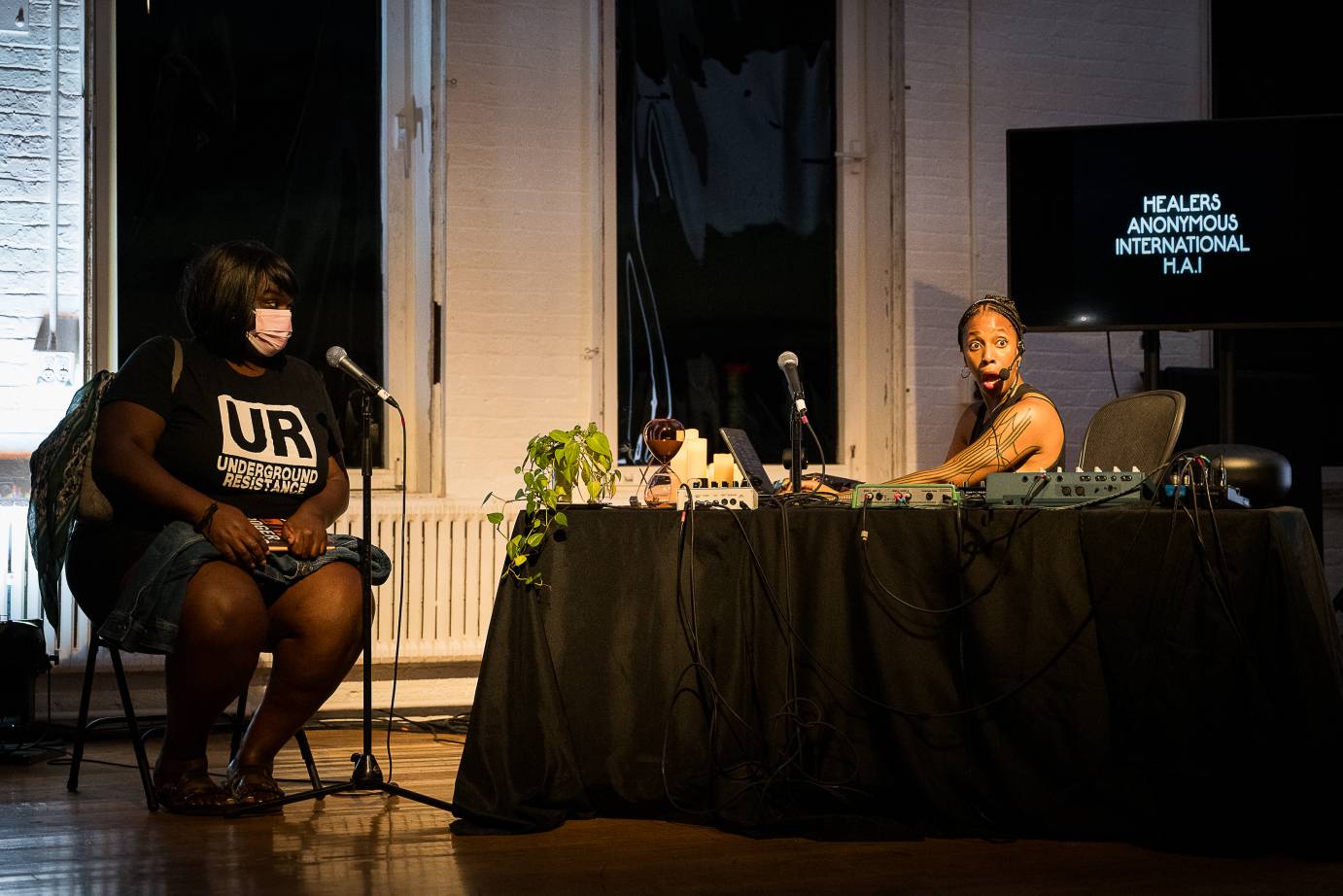
At the close of Anakwe’s program, a brief interlude opens and casual conversations peppers the crowd. Out of the corners of our eyes we notice short messages pop up on a screen at the far end of the space; we strain to read the small text, which reveals frank, intimate questions on love, care, and desire. Just as our attention turns, music bumps on and fuschia light spills onto a plush white couch in the middle of the room. Ude approaches, winding and swerving her hips to find rhythm and flavor through deep spinal and pelvic activation, her eyes closed in a private trance. Just as suddenly, she shatters the wall of mystery and invites us to share a drink. She pops bottle after bottle of cava, striding the room to pour out glasses, admonishing our shyness while the sounds of powerful female hip-hop and R&B vocalists fill the room. This is her party now.
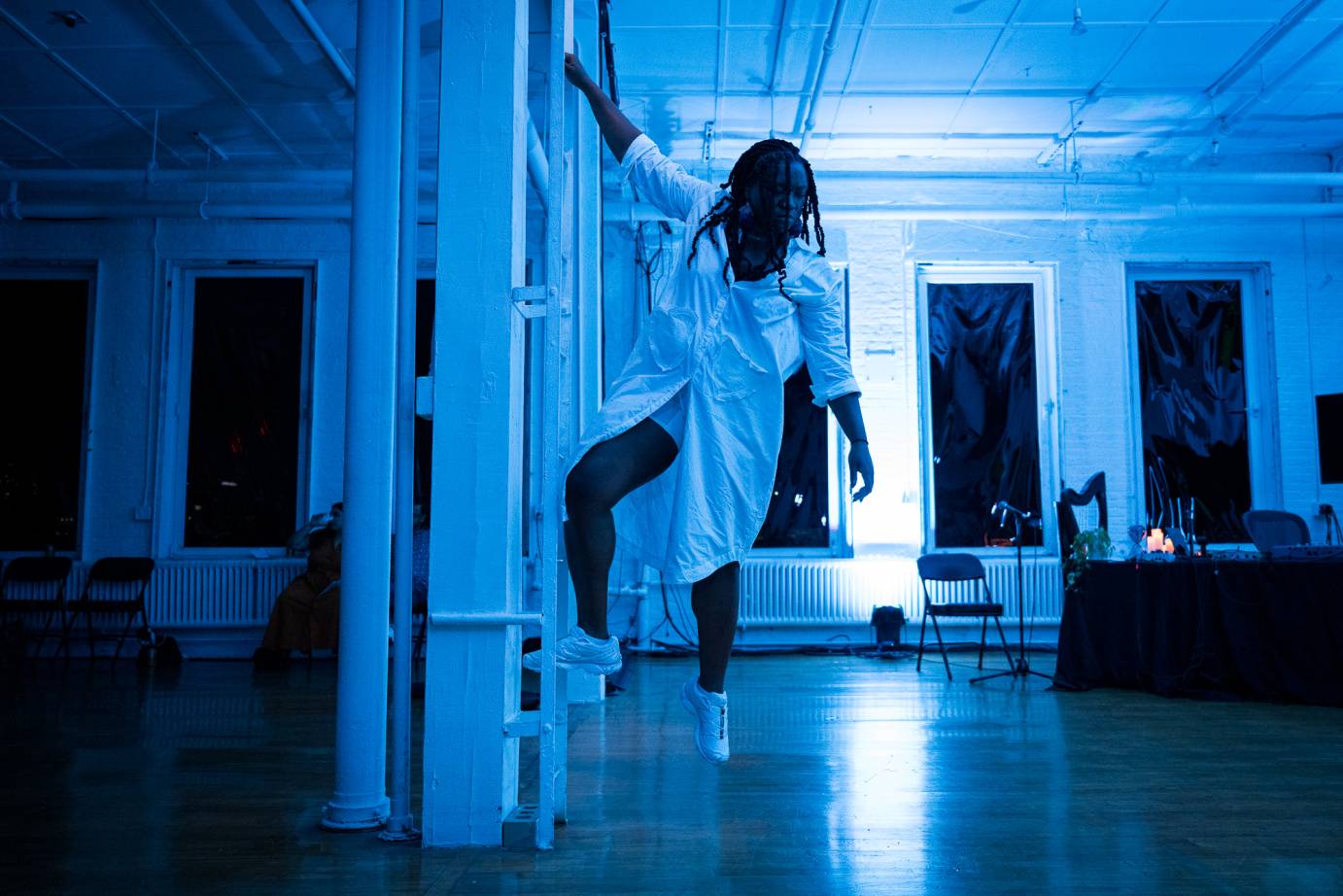
Ude’s what wanting wanted with what wanting was traffics in confessions and secrets while toying with our curiosity and complicity. An unseen voice (Anakwe) poses the questions as they arise on the screen, which Ude answers or evades in turn. She climbs a narrow ladder on one of the loft’s pillars, the precarity of her swinging body and the vulnerability of her statements wrapped up in the tension of holding on and the perils of letting go. Through anecdotes of fear, frustration, and bravery, she muses on loves and crushes; she dangles the most devastating crush before us, a rumor whispered only to trusted members of the audience.
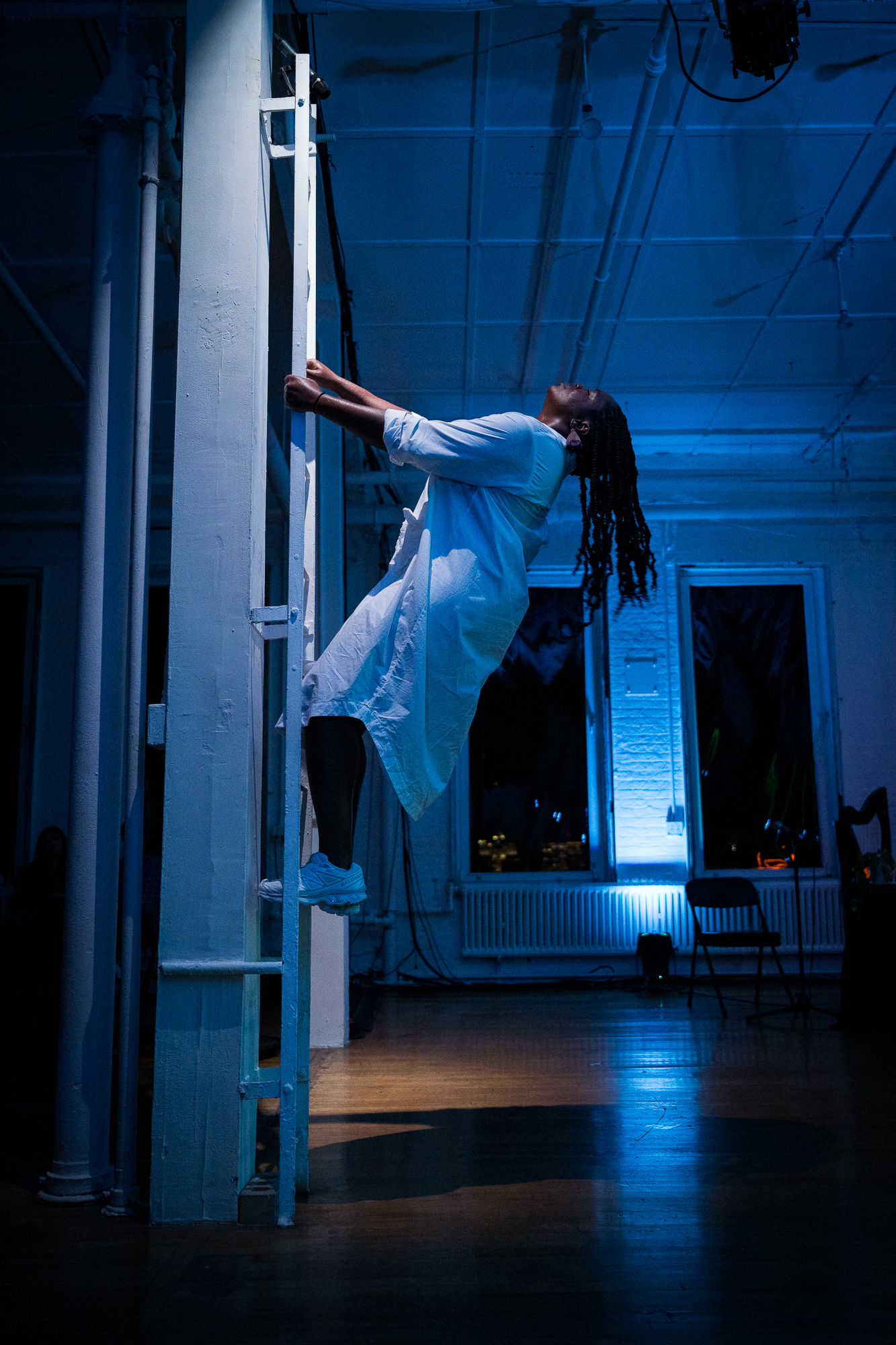
The artist takes the floor, devouring space with daring physicality, every vertiginous drop and rise fully present and affirmed in her assured body. Folding and sweeping, tumbling and recovering, she goes hard and soft at once as she calls out songs from her playlist to match the vibe. She pauses to retrieve her half-full glass of cava and takes a wild turn on the couch. Breath heaving, she settles into silence and plucks a sympathetic spectator to recite her “crush commandments” — all those things that wrench and protect her heart. A final sequence unsettles the psyche yet again as she makes a final confession: “she’s lying,” rising and repeating insistently to the point of hoarseness as she strides the space, calls the elevator, and steps inside to make her exit, still roaring.
As Ude’s voice fades down the elevator shaft, the darkened room moves into Anakwe’s epilogue, a meditation on death and rebirth. As in the opening, she begins with the voice, reciting text and looping vocal tones and rhythms into a densely layered harmonic cloud. She lights incense and small candles on the windowsills around her, conjuring fire: creator and destroyer, engine of life and bringer of death, shapeshifter and channel of primal vitality. As her soundscape unspools to a serene close, we sense a vibration toward a collective understanding of self and other—an apt close to an evening of shared experience.
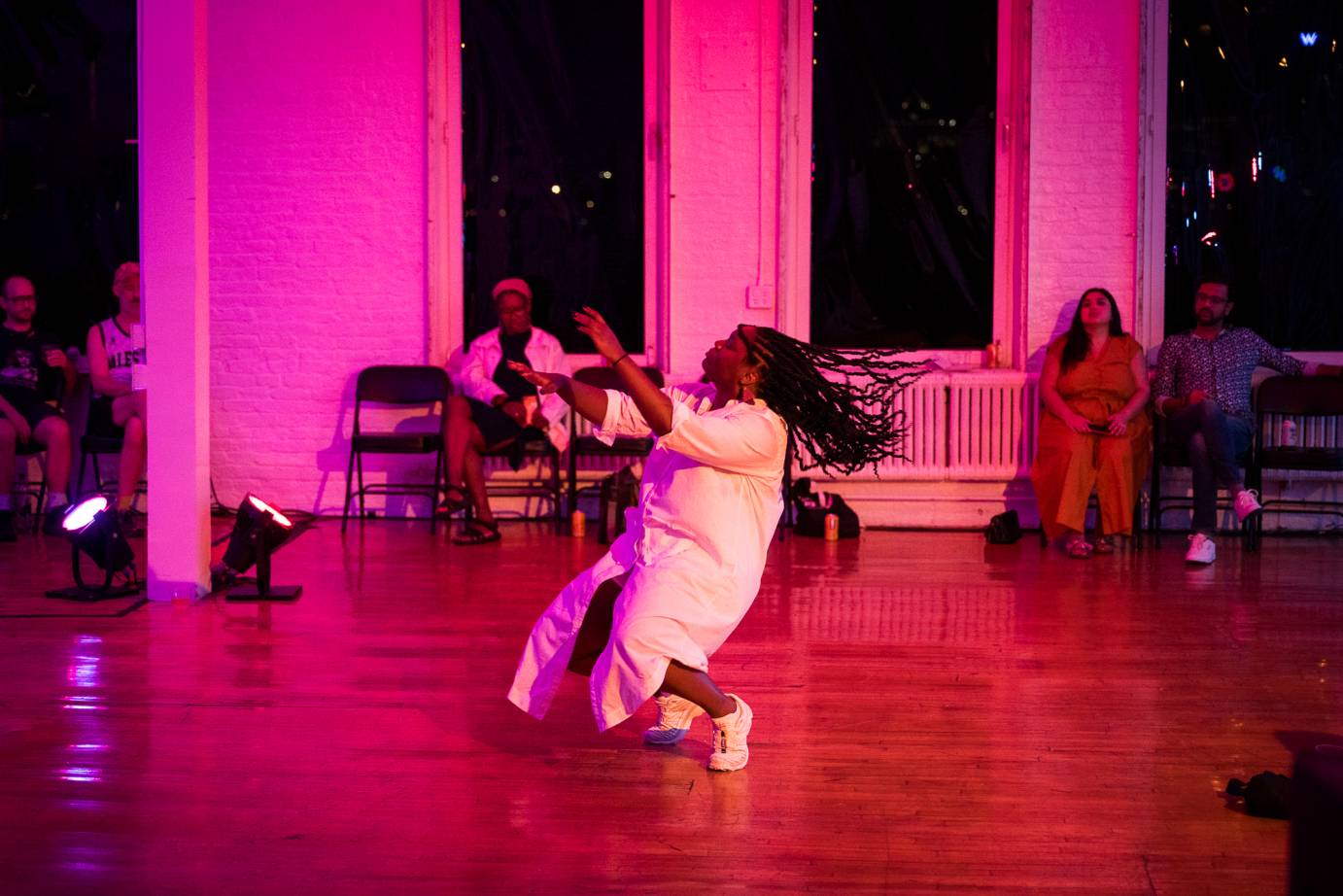
These artists challenge notions of performance through a participatory ethos that invites and implicates the spectator in the material of the work to co-create a choreography that extends beyond neatly planned steps and sequences for display and consumption. By recognizing and activating us as a vital and necessary part of performance, they and we open possibilities through embedded acts of empathic feeling, witnessing, and experiencing. Together Anakwe, tye, and Ude offer an evening of generosity, abandon, and deep care — I’d go back for more.













